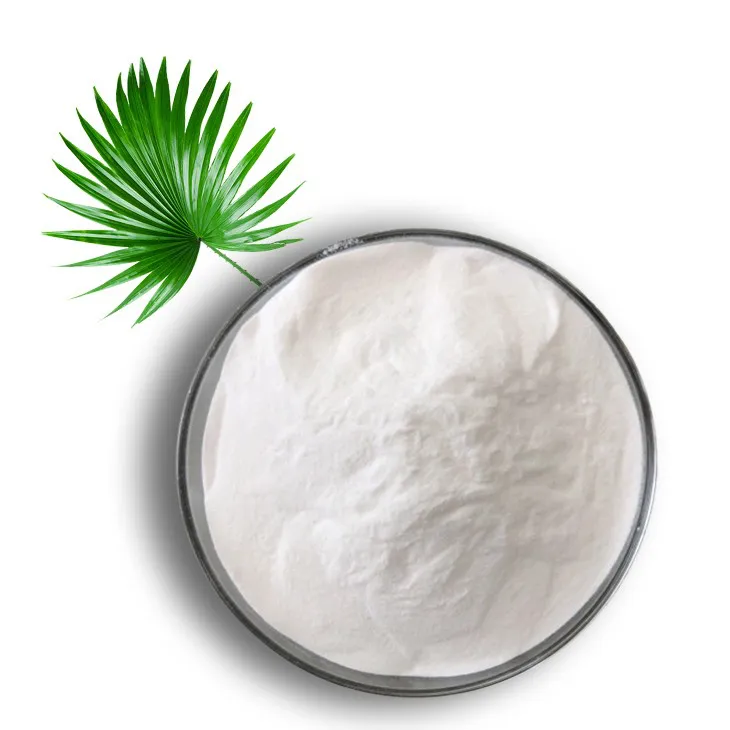- 0086-571-85302990
- sales@greenskybio.com
Saw Palmetto Extract: Is the Extract Effective for Weight Loss?
2024-11-14

Introduction
In the world of dietary supplements, the Saw Palmetto Extract has been a topic of much discussion, especially when it comes to its potential role in weight loss. With the increasing prevalence of obesity and the continuous search for effective weight - loss solutions, many people are turning to various supplements in the hope of finding an easy way to shed those extra pounds. But is Saw Palmetto Extract really a viable option? This article will explore this question in depth by looking at its impact on different aspects of the body related to weight management, such as body fat, muscle mass, and overall energy expenditure.

What is Saw Palmetto Extract?
Saw palmetto (Serenoa repens) is a small palm tree native to the southeastern United States. The extract is typically made from the berries of this plant. It has been used in traditional medicine for a variety of purposes, including the treatment of urinary tract problems in men, such as benign prostatic hyperplasia (BPH). However, its purported benefits for weight loss are a more recent area of interest.
Traditionally, the saw palmetto extract contains a variety of bioactive compounds. These include fatty acids, sterols, and flavonoids. Some of these components are thought to have potential effects on the body's metabolism, which could potentially influence weight loss.

The Link between Saw Palmetto Extract and Body Fat
Potential Mechanisms
One of the proposed mechanisms by which saw palmetto extract might affect body fat is through its impact on hormonal balance. Some studies suggest that it could influence the levels of hormones such as testosterone and estrogen. In men, for example, maintaining a proper testosterone level is important for muscle building and fat metabolism. If saw palmetto extract can help regulate testosterone levels, it could potentially enhance fat burning.
Another possible mechanism is related to its anti - inflammatory properties. Chronic inflammation in the body has been associated with obesity. The bioactive compounds in saw palmetto extract, such as flavonoids, may have anti - inflammatory effects. By reducing inflammation, it could potentially improve the body's metabolic function and help in the breakdown of body fat.
Research Findings
However, when it comes to research specifically on the impact of saw palmetto extract on body fat, the results are somewhat mixed. Some small - scale studies have reported a slight reduction in body fat percentage in participants who took saw palmetto extract supplements over a certain period. But these studies often had limitations, such as small sample sizes and short - term follow - up.
On the other hand, larger and more comprehensive studies have not consistently shown a significant effect on body fat reduction. For example, a recent meta - analysis of multiple studies on dietary supplements for weight loss, which included studies on saw palmetto extract, did not find conclusive evidence of its effectiveness in reducing body fat.

Saw Palmetto Extract and Muscle Mass
Role in Muscle Building
As mentioned earlier, saw palmetto extract may have an impact on testosterone levels. Testosterone is crucial for muscle growth and maintenance. In theory, if the extract can help maintain or increase testosterone levels, it could potentially support muscle building. This is important in the context of weight loss because muscle mass plays a significant role in metabolism. Muscle tissue is more metabolically active than fat tissue, meaning it burns more calories at rest.
Some anecdotal evidence from bodybuilders and fitness enthusiasts suggests that saw palmetto extract may help in improving muscle strength and size. However, scientific research in this area is still in its early stages. There have been no large - scale, long - term studies that can definitively prove a direct link between saw palmetto extract and muscle mass increase.
Preventing Muscle Loss during Weight Loss
During weight loss, especially when following a calorie - restricted diet, there is a risk of losing muscle mass along with fat. This can slow down the metabolism and make it more difficult to maintain weight loss in the long term. Some proponents of saw palmetto extract claim that it can help prevent muscle loss during weight loss. The idea is that by maintaining hormonal balance and potentially enhancing anabolic processes (related to muscle building), the extract could spare muscle tissue while the body is in a calorie - deficit state.
Nevertheless, again, there is a lack of strong scientific evidence to support this claim. While the theoretical basis exists, more research is needed to determine whether saw palmetto extract can actually protect muscle mass during weight loss.
Energy Expenditure and Saw Palmetto Extract
Basal Metabolic Rate
The basal metabolic rate (BMR) is the amount of energy the body needs to perform basic functions at rest. If saw palmetto extract can increase BMR, it could contribute to weight loss. Some researchers have hypothesized that the bioactive compounds in the extract may interact with the body's cells in a way that increases metabolic activity. For instance, it could potentially affect the mitochondria, the powerhouses of the cells, to make them more efficient in producing energy.
However, currently, there is no conclusive evidence to show that saw palmetto extract can significantly increase BMR. Studies that have attempted to measure changes in BMR in participants taking the extract have not shown consistent positive results.
Physical Activity and Energy Expenditure
Another aspect of energy expenditure is related to physical activity. Some claim that saw palmetto extract can improve endurance and energy levels during exercise, which could lead to increased calorie burn. This could potentially be due to its effects on hormonal balance or its antioxidant properties. For example, better hormonal balance might enhance the body's ability to use stored energy during exercise, while antioxidants could reduce oxidative stress and improve muscle function.
Nonetheless, the evidence for such effects on physical activity - related energy expenditure is also not very strong. While some small - scale studies have reported subjective improvements in energy levels during exercise in participants taking saw palmetto extract, objective measures of increased calorie burn have not been consistently demonstrated.
Side Effects and Precautions
Before considering using saw palmetto extract for weight loss, it is important to be aware of its potential side effects. Some people may experience digestive issues such as nausea, vomiting, or diarrhea when taking the extract. In addition, it may interact with certain medications, especially those related to blood - thinning or hormonal therapies.
For example, if you are taking anticoagulant medications, the use of saw palmetto extract could increase the risk of bleeding. And for those on hormonal medications, the extract's potential impact on hormonal balance could lead to unwanted side effects. It is always advisable to consult a healthcare provider before starting any new supplement, especially if you have pre - existing medical conditions or are taking other medications.
Conclusion
In conclusion, the saw palmetto extract has generated interest as a potential weight - loss aid, but the current scientific evidence does not strongly support its effectiveness in this regard. While there are some theoretical mechanisms by which it could impact body fat, muscle mass, and energy expenditure, the research findings are inconsistent and often lack the robustness needed to make a definitive claim.
Moreover, the potential side effects and interactions with medications should not be overlooked. If you are looking for effective ways to lose weight, it is generally recommended to focus on evidence - based strategies such as a balanced diet, regular physical activity, and behavior modification. While saw palmetto extract may not be a "magic bullet" for weight loss, further research may shed more light on its potential benefits or limitations in the future.
FAQ:
What is saw palmetto extract?
Saw palmetto extract is a substance derived from the fruit of the saw palmetto plant. It has been used in traditional medicine for various purposes, and now there is interest in its potential role in weight loss.
How might saw palmetto extract affect body fat?
There are some theories that saw palmetto extract could potentially influence body fat. It might interact with hormonal balance in the body, as some hormones are related to fat storage and metabolism. However, more research is needed to fully understand the extent of its impact on body fat.
Can saw palmetto extract increase muscle mass?
There is currently no strong evidence to suggest that saw palmetto extract directly increases muscle mass. Muscle growth is mainly related to factors such as resistance training and proper protein intake. While it may have some effects on overall body function that could indirectly affect muscle, this has not been clearly established.
Does saw palmetto extract boost overall energy expenditure?
Some studies have investigated whether saw palmetto extract can boost energy expenditure, but the results are inconclusive. It may have some minor effects on the body's metabolic processes, but it is not clear if these effects are significant enough to contribute to substantial weight loss.
Are there any side effects of taking saw palmetto extract?
Some people may experience side effects when taking saw palmetto extract. These can include digestive issues such as nausea, vomiting, or diarrhea. In addition, it may interact with certain medications, so it's important to consult a healthcare provider before starting to take it.
Related literature
- The Potential of Saw Palmetto Extract in Metabolic Health"
- "Saw Palmetto and its Impact on Body Composition: A Review"
- "Investigating the Role of Saw Palmetto in Weight Management"
- ▶ Hesperidin
- ▶ Citrus Bioflavonoids
- ▶ Plant Extract
- ▶ lycopene
- ▶ Diosmin
- ▶ Grape seed extract
- ▶ Sea buckthorn Juice Powder
- ▶ Fruit Juice Powder
- ▶ Hops Extract
- ▶ Artichoke Extract
- ▶ Mushroom extract
- ▶ Astaxanthin
- ▶ Green Tea Extract
- ▶ Curcumin
- ▶ Horse Chestnut Extract
- ▶ Other Product
- ▶ Boswellia Serrata Extract
- ▶ Resveratrol
- ▶ Marigold Extract
- ▶ Grape Leaf Extract
- ▶ New Product
- ▶ Aminolevulinic acid
- ▶ Cranberry Extract
- ▶ Red Yeast Rice
- ▶ Red Wine Extract
-
Bitter Melon Extract
2024-11-14
-
Konjac Powder
2024-11-14
-
Hericium erinaceus extract powder
2024-11-14
-
Tongkat Ali Extract Powder
2024-11-14
-
White Peony Extract
2024-11-14
-
Horse Chestnut Extract
2024-11-14
-
Bayberry Extract
2024-11-14
-
Lavender Extract
2024-11-14
-
Uridine-5'-monophosphate Disodium salt
2024-11-14
-
Agaricus Blazei Extract
2024-11-14





















